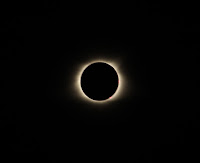The 2017 Total Solar Eclipse
The 2017 Total Solar
Eclipse
Over the
several weeks, we’ll see quite a few photos of the solar eclipse. Most of them will be a heck of a lot better
than mine (two are above – It’s a lot harder to take these types of photos than
you’d think). So, rather than post a
bunch of out-of-focus photos, I thought I would describe the experience
instead. This was my first total solar
eclipse and all the photos I’ve seen over the years don’t do the experience
justice.
I knew you
needed special viewing glasses to prevent eye injury, but it never occurred to
me that your camera needed protection, too.
There’s a special solar filter you need to use otherwise you can
actually melt the innards of your camera.
Except during the period of totality.
It’s still hard to focus though, mainly because I was so excited and was
just trying to get as many photos as possible in the short amount of time. I was going to start a live FB session, but
forgot until about halfway through.
I had heard the
news stories of 15 mile backups on roads in Oregon and was figuring I’d run
into traffic, but I never hit eclipse viewer traffic. A smooth ride the entire way. I drove to Kentucky, intending to view the
eclipse at Fort Campbell. Reviewing the
NASA eclipse map, however, I decided to head towards Hopkinsville, KY, which
lay right in the path of totality. I
ended up at the James E. Bruce Convention Center. They were charging $20 for parking, but the
guy took pity on me since I didn’t have that much and only took $10. I was amazed at how small the crowd was. There were about 12 tour bus loads of people
and about 40-50 cars in the parking lot.
Vehicles tags testified to the fact that people from all over the
country, from Colorado to New York, had traveled to view the eclipse.
As the moon
started to cover the sun, you don’t really notice any really change in the
amount of light. Even at about halfway,
there’s still enough light coming through to make hard to think there’s an
eclipse. Most people were still wandering
around (there were food and beverage vendors inside), occasionally looking
up. As more and more of the sun became
covered, you noticed a slight decrease in the light. At about 80% coverage, it’s like twilight,
only the shadows are going in the wrong direction – it was slightly
disorienting. As the sun approached 90%
covered, more and more people were looking up.
You could hear people start talking excitedly as the sun became more
covered. You could feel the excitement
build in the crowd as we got closer to total eclipse.
There’s a point
right before totality called the diamond ring phase. At this point, only a very small part of the
sun remains, but enough light is coming around the moon to make a ring (photo
to the left). As the eclipse became
total, cheers went up from the crowd. I
stood mesmerized for a couple of seconds just watching. At this point you don’t need the viewing
lenses so you can watch with the naked eye.
The photo on the left is what you see.
It was
incredible! After a couple of seconds, I
started taking photos. It was my first
attempt with amateur photo equipment, so my photos will never make it to
NatGeo, but who cares? The photos will
help me remember one of the most incredible experiences of my life. I got the diamond ring shot above at the end
of totality, the photo above. One thing
amazed me. When we look at the sun, we
see yellow light. But at the diamond
ring point, that small part of the sun that’s peeking out from behind the moon
is a bright white. I guess that’s why
they call it the diamond ring.
My
non-Christian readers will have to indulge me for a moment. As I stood gazing at the eclipse and taking
photos, I realized what a perfect collection of variables was being
demonstrated in the sky. I find it
impossible to believe that mere happenstance has resulted in 1) the earth
having a satellite at all, 2) that the satellite would be the perfect size to
cover the sun (all but the corona), 3) that the satellite would be at the
perfect distance from the earth to eclipse the sun, and 4) that the orbit of
the satellite would be such that it would create an eclipse in the first place. No, coincidence isn’t at play here, it’s the
hand of an intelligent creator, God. You
can’t convince me otherwise, sorry (not sorry).
All in all, it
was a wonderful experience. Afterward I
reflected on how the excitement had united us.
During the time leading up to the eclipse, there was a palpable
excitement among the crowd. During the
period of totality, every eye was looking up into the heavens. For a couple short hours, particularly for
the 2 minutes or so of the total eclipse, it didn’t matter who you were: black,
white, old, young, American, foreign, liberal, conservative, male, female, Christian
or Buddhist. It just didn’t matter. The eclipse united us all like nothing else
had done recently. Watching the eclipse
was the experience of a lifetime. I’m
glad I drove the 3 ½ hours to see it.
But more than anything else, it gave me hope for us as a people and as a
country. Unity is possible, we just need
to pursue it. But what do I know? I’m no astronomer. This is just my two cents … for what it’s
worth.


Comments
Post a Comment